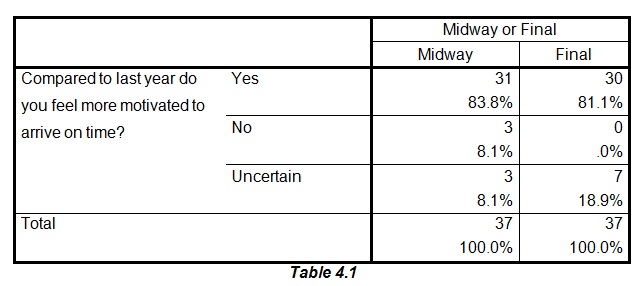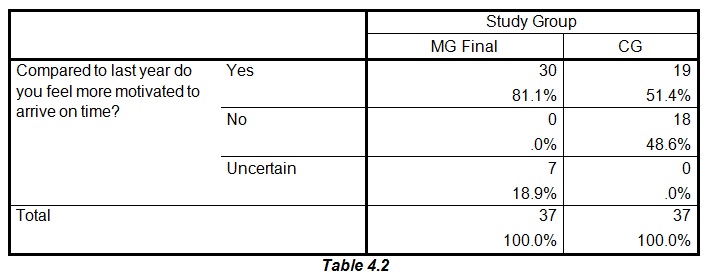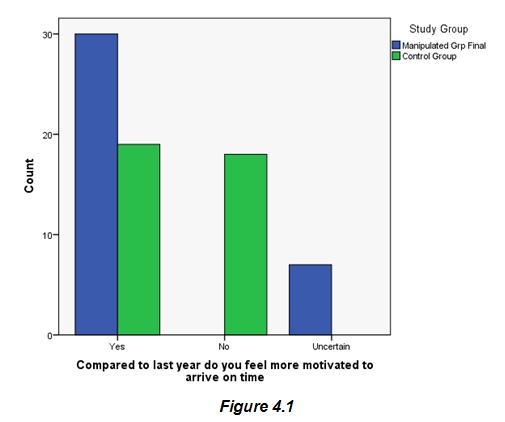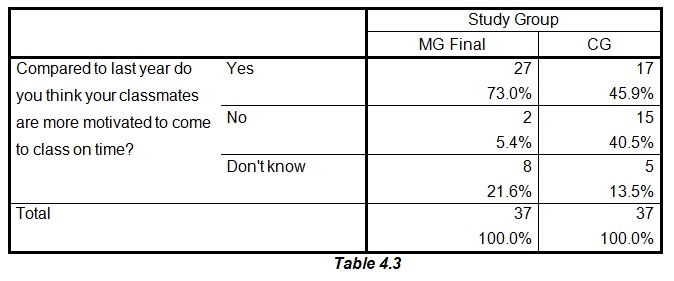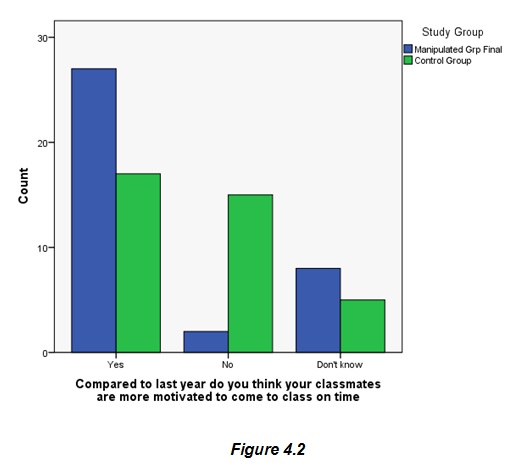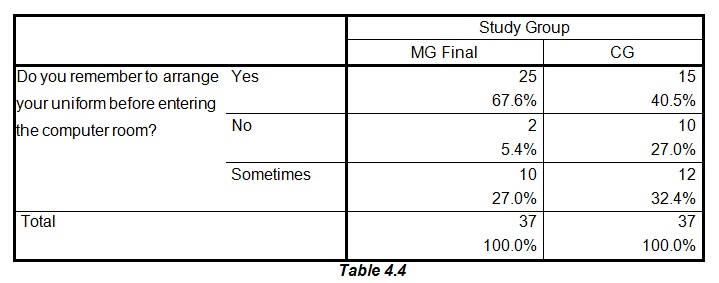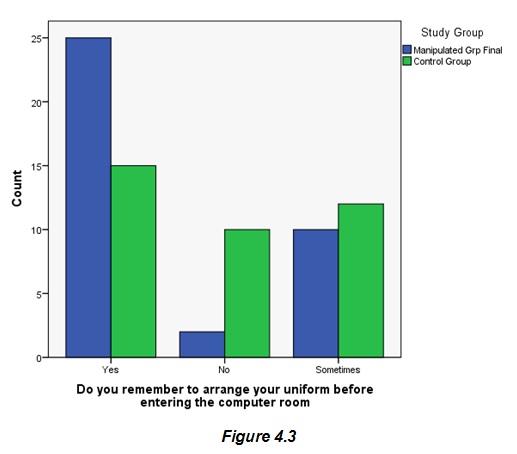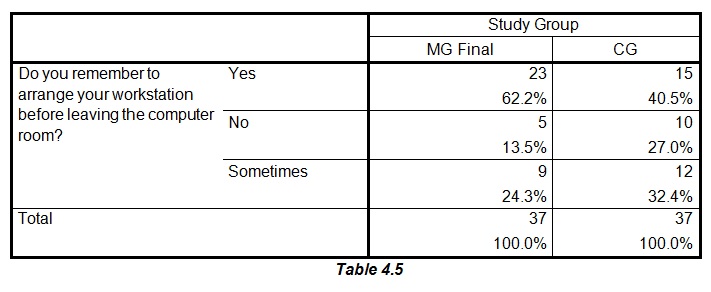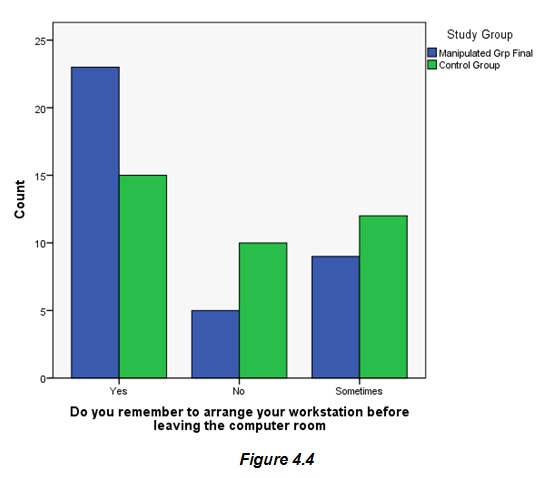Chapter 4 – Rules
Behaviour in class
When I asked the interviewees from MG1 if they preferred ICT lessons delivered as a multiplayer classroom, they all said that they did and Delpiero added:
|
Contents Rules 3 Uniform |
The others agreed that they too felt that they wanted to pay more attention in class this year compared to last year; two interviewees said:
Delpiero: You try and do more work.
The interviewees from MG2 concurred.
MG2’s behaviour is usually worse than MG1’s but during the study I noticed a marked improvement: when asked, the interviewees from MG2 agreed that they tried to behave better in class because of the game elements. Two interviewees said:
Wolverine: Yes, we had a bit more of a push because of the XP and HP.
In both CG there were some behavioural issues and in week9 I had to report a student to the Assistant Head due to disrespectful and arrogant behaviour.
There were three particular negative traits I monitored throughout this study and these are discussed below.
Punctuality
The majority of MG2 arrived late during the first two weeks of term; however, once the multiplayer classroom started this improved. In week1 four arrived late, the following week one arrived late, and in week3 & week4 all were on time. In week5, three students were late; however, two of them brought a note excusing them: this was a first for this class.
An unanticipated problem was other teachers dismissing the students late: a few times MG1 arrived late together, out of breath and apologising. After this occurred a few times I spoke to the teacher concerned to rectify the problem. Apart from these occasions, all of MG1 arrived on time. Some students would exult “Yes!” when I confirmed that they were on time and would receive the XP.
When I asked the interviewees from MG2 what they liked about the multiplayer classroom, Wolverine said, “Run for the XP!” Both MG responded positively to receiving XP for punctuality – there was even some friendly rivalry over who arrived first, even though no extra points were awarded for being first.
The enthusiasm continued throughout the study although at times a few from MG2 lacked interest; for example in week7 Greengoblin arrived late, saying, ‘So what if we lose points?’ He was the only one late in week8 but was punctual in week9 and, after asking if he was on time, asked if he would receive any points as he ‘died’ last lesson: he seemed pleased when I said that he was rebooted to 50HP. In week10, Penguin and Bane arrived late, saying, “It’s only 50XP”[1]50XP was awarded for being punctual. ; when I pointed out that they had also lost 15HP for being late Bane exclaimed, “That much?” They were not late again.
There was a significant difference (Χ2(2,N=74)=4.616, s) between the results of the midway and final questionnaires which the MG completed (Table 4.1).The three students who said ‘no’ in the midway questionnaire changed their opinion, answering either ‘uncertain’ or ‘yes’ in the final questionnaire. One student who said ‘yes’ at the midway point was later uncertain at the end of the study. Overall, the majority agreed that they did feel more motivated to arrive to class on time.
There was also a significant difference (Χ2(2,N=74)=27.469, s) between the MG and the CG. 11 more students from the MG agreed that compared to last year they felt more motivated to arrive on time, and while there were no students from the MG who answered negatively (though 7 said they were uncertain) 18 in the CG said they did not feel more motivated (none were uncertain) (Table 4.2 and Figure 4.1).
Both interview groups said that they felt more motivated to arrive on time this year, and believed that their classmates were more motivated too:
Delpiero: The ones who didn’t use to come on time before now have an extra reason to come on time this year.
There was a significant difference (X2(2,N =74)=12.906, s) between the opinions of the MG and the CG with regard to their peers motivation. The MG had a more positive response, with ten more students believing that their peers where more motivated to come to class on time. There were also 13 more students who in the CG answered ‘no’ to their peers’ feeling more motivated to arrive on time (Table 4.3 and Figure 4.2).
A comment from one interviewee about his motivation to be punctual led to an observation about his peers that I had not noticed or considered:
This was interesting and unexpected, as students are allowed to go to the toilet and there was never any mention that HP would be deducted for doing so.
In week2 Hulk sat on the stairs during the break to ensure he would be punctual: I overheard him telling another teacher that he was using ‘a cheat mode’ not to lose XP. I also noticed a few students waiting in the region of my classroom. In week4 there were four students waiting outside the classroom during the break; the following week there were eight. A few teachers commented that they had observed quite a few students from MG1 and MG2 arriving on time to my class and asking, ‘Are we late?’ One colleague asked if I could explain what I was doing in my lessons so she could do something similar: she recounted an occasion when she was supervising in the corridor and five students from MG2 wanted to wait outside my classroom.
Although I appreciated the students’ enthusiasm, running in the corridors and being in the corridors during breaks is against school regulations so I introduced an HP penalty for anyone breaking these rules; this resolved the problem and did not affect punctuality.
In week13 all students were on time but one in particular surprised me: I was waiting in the corridor when Penguin saw me and shouted, ‘I’m coming, Sir!’ He said, ‘I’m not late this time, eh?’ then continued saying that he did not have a timetable – and if I did not believe him I could search his bag; he added that he was having some problems[2]The Guidance Section was informed about this. so school is the last thing on his mind, but apologised for occasionally being late – this left me flabbergasted, as I never saw him act this way.
The pattern for the CG remained the same throughout the study: every week a few students arrived late. CG2’s ICT lesson immediately followed the morning’s assembly[3]Attendance at assembly is mandatory, after which the teacher of the first lesson escorts the students to their classroom. so there should not have been any late arrivals yet there were a regular number of students (6 in particular) who arrived late to the lesson.
Uniform
There was a significant difference (X2(2,N=74)=8.015, s) between the CG and MG responses about uniforms. 10 more students from the MG agreed that they remembered to arrange their uniform before entering the computer room. 2 students from the MG said they did not remember to arrange their uniforms, while 10 students from the CG said they did not remember (Table 4.4 and Figure 4.3).
In the MG there was a marked improvement with uniforms. In week2 ten students from MG1 lost HP because of their uniforms, the following week two students lost HP, but from then onwards no one lost HP because of uniforms. It was a similar situation with MG2: from week4 onwards no one lost HP because of uniforms. The MG would remind each other to check their uniforms; however there was no change in the CG, I had to keep telling them to arrange their uniform.
Two interviewees from MG1 said that they always try to look smart, regardless of the XP, while the others said that they felt more conscious of looking smart this year: Delpiero added:
The interviewees from MG2 agreed that everyone paid more attention to looking smart this year because “nobody wants to lose XP” (Superman). MG1 also said that before going to other lessons they usually remembered to check their uniform; MG2 said they sometimes remembered, but not always.
Workstations
Throughout the study I had to continually remind the CG to tidy their workstations, and even after reminding them I sometimes had to arrange things myself. Overall, CG1 were slightly better at tidying their workstation than CG2, although I had to badger them. The MG demonstrated a definite improvement.
There was a significant difference between the responses (X2(2,N=74)=3.779, s) from the CG and MG. (Table 4.5 and Figure 4.4)
In week1, a student from MG1 tidied his workstation and reminded his peers to do the same; by week3 all students remembered with one lapse in week11. In week4, one student stayed behind after his classmates had left to ensure everything was in its place: in the past, if I had asked one or two students to do this they would have complained, so to have students volunteering, without any prompting, was an improvement.
MG2 took slightly longer to respond to the loss of HP, but did improve. After Teams B and C lost 10HP in week4, two students stayed behind in week5 to ensure everything was in its place; in week6, one member from each team stayed behind; in week7 Teams A and B forgot and lost HP. By week8 all remembered to tidy their workstations and this continued until the end of the study. In week12 Team B forgot to push their chairs under their desks; however they did not lose HP as Hercules from Team A arranged them.
In week8, a student from MG2 purposely moved some chairs out of their place as an act of sabotage, but when he realised I had noticed he pushed them back – I told him that he would lose HP if he did that again. The same thing occurred in week13 with a different student.
